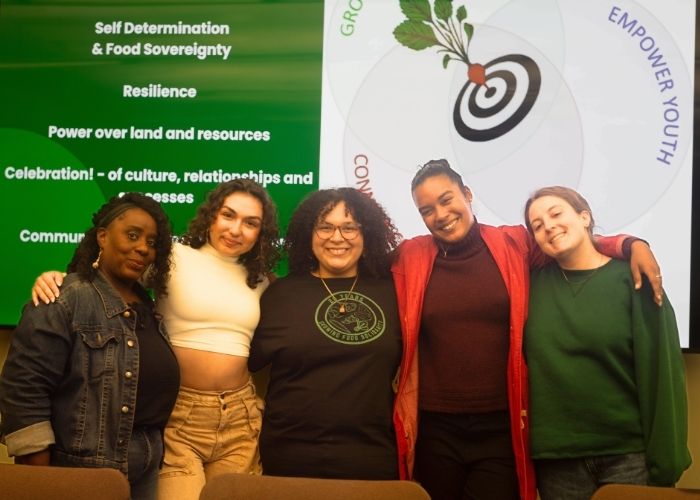
On Monday, October 7, Wesleyan students, faculty, and members of the broader community broke with their lunch routines to attend “Food Justice & Solidarity in New London, CT, sponsored by a grant from the Robert F. Schumann Foundation to the Schumann Institute of the Bailey College of the Environment. There were about 20 Wesleyan students, staff and faculty, as well as community members in attendance. The hour-long workshop was facilitated by Julie R. Jacome-Garay (Co-Director of Operations and Programming) and Chloë Nuñez (Youth Program Manager) of FRESH New London, with the aim of spreading awareness about the organization’s food justice work. Despite its short duration, the workshop was packed full of informative and engaging content. Following group introductions, we got to know Julie and Chloë, learned in-depth about FRESH’s work, and heard stories from Wesleyan food justice interns who were placed at FRESH this summer.
The bulk of the workshop consisted of a presentation by Julie and Chloë detailing FRESH New London’s mission and styles of activism. FRESH’s work is guided by a clear set of values: racial and social justice, sustainability of people and planet, blame/shame-free culture, people over profit, democratic decision-making, access with dignity, and equity.
FRESH places a strong emphasis on youth leadership. The organization provides their youth with political education that is absent from most school curricula, giving young people the knowledge and tools to work towards a more equitable food system. Furthermore, FRESH pays young people for their time, which makes the work accessible to young people from a range of socioeconomic backgrounds.
FRESH uses local agriculture to bring together the diverse New London community. FRESH prioritizes equity by meeting community members where they are: they build raised beds at family homes so residents can grow on their own properties, provide private beds for families and free public snack beds in their community gardens, as well as holding produce distribution events every weekend.
In place of a top-down leadership, FRESH is operated democratically with contributions from all its members. This leadership model ensures that the organization is always centering the needs of the community in their decision making processes and allowing space for disagreements. For example, FRESH conducts regular surveys in New London to ensure their focus remains on culturally relevant crops that meet the community’s needs.
Julie and Chloë presented their People’s Food History timeline, which outlined some of the historical events like enslavement and genocide of indigenous peoples that have been at the basis of our unjust food system. They expressed interest in returning to Wesleyan to talk further about this timeline and other aspects of their work. Wesleyan’s Bailey College of the Environment is excited to continue our partnership with FRESH New London through summer food justice internships and educational events.
Pictured above, left to right: Seanice Austin (FRESH New London, Co-Director of Admin), Anisah Colon (Wesleyan Student/Summer Intern at FRESH), Julie R. Jacome-Garay (Co-Director of Operations and Programming), Chloë Nuñez (FRESH New London, Youth Program Manager), Catherine Sherman (Wesleyan Student/Summer Intern at FRESH). Photo by Michael Fadugbagbe.